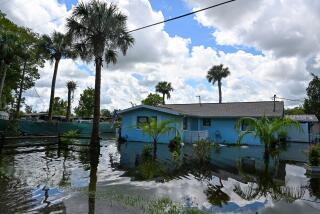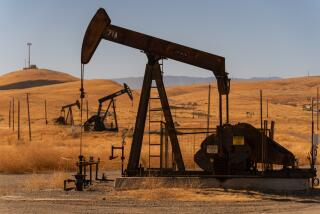National security fears used to sell climate bill
- Share via
WASHINGTON — After months of promoting President Obama’s climate plan as a vehicle to create millions of clean-energy jobs, supporters of the legislation are increasingly pushing another strategy -- its benefits for national security.
It’s a deliberate, anxiety-themed effort to press a handful of fence-sitting moderates to support a bill that will probably be the administration’s next great legislative push after healthcare.
A coalition backing the energy and climate bill pending before the Senate has enlisted war veterans to pressure senators in person.
In television advertisements, the coalition calls dependence on foreign oil a threat to national security and fuel for terrorists.
Other new ads feature pictures of angry Middle Eastern crowds and impoverished “climate refugees,” many apparently African.
One recent poll from climate bill supporters tested voter opinions on the statement that global warming would “destabilize developing countries, creating the conditions for war and a breeding ground for terrorism -- and lead to mass movements of people from places like Mexico and Central America that will overwhelm our borders.”
The national poll by Democratic pollster Mark Mellman found voters agreed far more with that stance than with a statement echoing Republican arguments against the bill -- chiefly, that it would raise energy prices and kill American jobs.
Buoyed by the poll results, and by other surveys that show voter support for a jobs-themed clean-energy pitch, climate bill supporters are fusing their security message with their ongoing focus on the economic opportunities of industries such as wind turbine and solar panel manufacturing.
The messages intertwine in a commercial launched last week by Clean Energy Works, a newly formed band of environmental, labor, religious, veterans and other groups that support the climate legislation. The ad opens with this warning: “When we spend a billion dollars a day on foreign oil, we don’t just waste our money. We put our economy in the hands of hostile nations.”
The climate bill would limit the heat-trapping gas emissions from power plants, factories and other sources that scientists blame for global warming.
Critics mock the argument that it would boost U.S. security.
“Passing the bill would create far more severe, dangerous and imminent global crises,” James Jay Carafano, a researcher for the conservative Heritage Foundation, wrote last month.
He added: “The law would ensure a steep decline in U.S. economic competitiveness and military preparedness. The consequences of a weak America would inevitably lead to a string of national security crises and an undermining of the nation’s capacity to deal with natural disasters here and abroad.”
The security argument has been invoked by both sides in previous unsuccessful congressional pushes for greenhouse gas limits. Presidents and candidates for federal office have promised energy independence for decades.
But this time, climate bill proponents say, polls show the security argument could prove powerful. The survey by Mellman last month found that a majority of voters called global warming a serious threat to national security.
The poll was conducted for the American Security Project, one of the groups in the Clean Energy Works coalition. The project’s board of directors includes retired generals and Sen. John F. Kerry (D-Mass.). Kerry is helping draft the Senate climate bill.
The American Security Project released a “climate security index” last week that bluntly warned of multiple hazards from global warming.
The threats include rising seas and drought, which the group says could destabilize fragile nations, send refugees flowing over borders and provide new recruiting opportunities for terrorist groups.
“The places which are already the biggest problem areas for terrorism are those that are going to be most affected by climate change dynamics,” said Bernard I. Finel, a senior fellow and terrorism expert at the project. “We expect that [warming] will only exacerbate the problem. . . . It’s going to create a much bigger pool for terrorists to draw from.”
Critics say warming doesn’t necessarily mean conflict.
For example, Carafano wrote, “As the Arctic ice melts and the environment becomes more benign, Arctic waters will become more available for fishing, mineral and energy exploitation, and maritime transport. Nations will compete over these resources, but it is how they choose to compete -- not the change in the weather -- that will determine whether war breaks out.”
--
More to Read
Sign up for Essential California
The most important California stories and recommendations in your inbox every morning.
You may occasionally receive promotional content from the Los Angeles Times.










